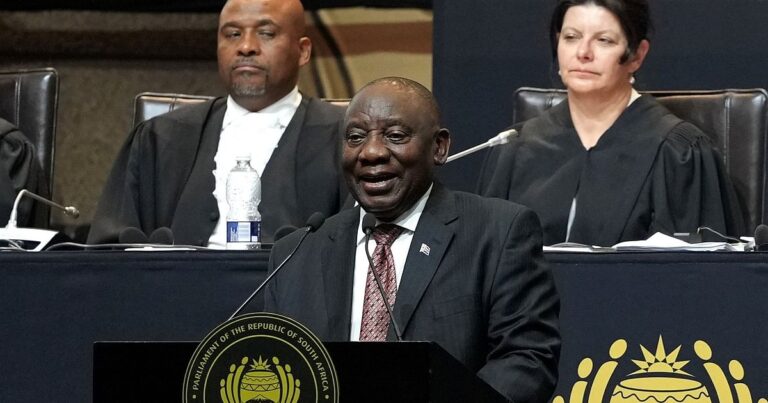JOHANNESBURG: South African President Cyril Ramaphosa has been re-elected for a second term by lawmakers after the African National Congress and the Democratic Alliance reached a historic agreement to set aside their differences and form a coalition government.
President Ramaphosa’s ANC lost its parliamentary majority for the first time in three decades in last month’s general election, winning 40% of the vote with the Democratic Alliance (DA) coming in second with 22%.
The new Government of National Unity will bring together Ramaphosa’s ANC, the centre-right DA and smaller parties.
President Ramaphosa, 71, comfortably defeated Julius Malema, leader of the far-left Economic Freedom Fighters (EFF), in a vote late on Friday night, with Ramaphosa receiving 283 votes to Malema’s just 44.
On the same day, parliament elected the ANC’s Thoko Didiza as speaker and the DA’s Annelie Lotrije as deputy speaker.
President Ramaphosa is due to announce his new Cabinet after the inauguration on Wednesday.
In his victory speech, President Ramaphosa praised the new coalition government and said voters expected its leaders to “act and work together in the interest of all the people of our country”.
His election, ending days of speculation, was decided near midnight on Friday after last-minute talks between parties to form a Government of National Unity (GNU), with frequent interruptions in parliament and a drawn-out voting process.
The ANC’s alliance with the predominantly white DA, the Inkatha Freedom Party (IFP), which came in fifth place, and the minority Patriotic Front (PF) drew mixed reactions from both party members and the public.
Some have hailed the alliance as a new era in South African politics, sending a strong message of reconciliation and boosting the struggling economy, especially after Mkhonto we Sizwe (MK), a new party set up by ousted president Jacob Zuma, and the EFF, which came in fourth, refused to work with the DA.
Others say the ANC has betrayed the people by teaming up with the DA, the official opposition party that has opposed some of the ANC’s policies since it first came to power under Nelson Mandela in 1994.
However, the GNU partners agreed that the coalition was in the interests of the South African people.
“Six million people voted for us because they want us to continue with a transformational plan that will change people’s lives for the better,” ANC secretary-general Fikile Mbalula told a news conference as voting continued in parliament, acknowledging that the ANC cannot do it alone.
“We are not in a position to govern this country alone. We need to work with other countries,” Mbalula said.
DA leader John Steenhausen also appears to be in good spirits.
“The statement, which emerged from intense but very mature negotiations over the past two weeks, charts a new course for our country.
“At the heart of this statement is a shared respect for our nation’s Constitution, including the Bill of Rights, and for upholding the rule of law as a whole,” Steenhausen said.
IFP spokesman Inkosi Mzamo Buthelezi said the party had agreed to vote for the candidate put forward by the ANC.
“The people have placed their trust in us as leaders and it is up to the 400 members of parliament to decide how to move the country forward,” Buthelezi said.
“We are thrilled that our leaders are putting South Africa first,” PF leader Gayton McKenzie said.
Twenty minutes before the start of Friday morning’s session, the situation in South Africa was tense as there was still uncertainty about GNU.
MK surprised analysts and pollsters by coming in third in the election, but decided to skip parliamentary sessions to protest allegations of electoral fraud – something the party has filed legal proceedings against but is yet to provide evidence for.
EFF deputy leader Floyd Shivambu said the DA was born out of the colonial apartheid era and was only interested in “protecting the interests and privileges of the white minority.” Other minority parties refused to join the GNU but because they only had a few seats in parliament, some with just one, their votes were deemed negligible in the final tally.
The chief ministers of the nine states were also elected in separate meetings in their respective capitals.
With a national GNU-inspired coalition, the IFP won the premiership in KwaZulu-Natal, defeating MK, who had a 45 percent majority.
In the Western Cape, where the DA has already ruled for several years, a candidate from that province was returned to the premiership.
Seven other provinces, including the economic heartland of Gauteng, again had ANC premiers.
As news of GNU emerged, share prices on the Johannesburg Stock Exchange soared, particularly in the financial sector, amid concerns that a nationalisation-backed EFF and MK government would scare away investors.
The ANC has consistently enjoyed support rates of more than 50 percent since the country’s first democratic elections in 1994, when Nelson Mandela became president.
But support for the party has fallen sharply amid anger over corruption, unemployment and high crime.
Speaking to South Africa’s Parliament after his confirmation, President Ramaphosa recalled the party’s first presidential victory 30 years ago.
“We have been here before. We were here in 1994 when we tried to unite the country and bring about reconciliation. And we are here now,” he said.
Published June 15, 2024 06:55 IST

